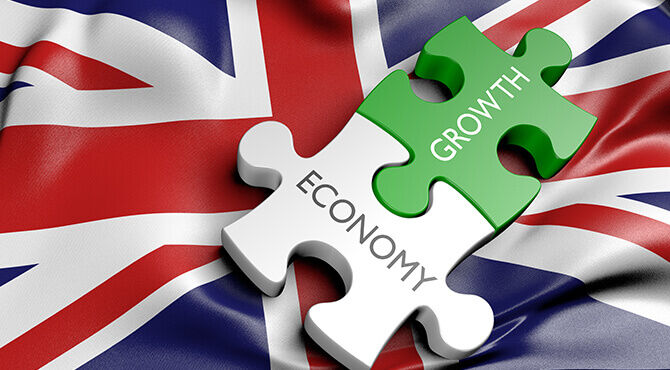The UK economy grew 0.6 per cent in the three months to July – its fastest quarterly pace in almost two years and up from 0.4 per cent in the three months to June, according to official figures recently published.
On a month-by month basis, gross domestic product was up by 0.3 per cent in July compared to June, while separate figures from the Office for National Statistics (ONS) showed that the nation's trade deficit, including services, stood at just £100 million in July, much better than analysts had been expecting and down from £900 million in June.
The GDP increase was attributed partly to a boost in July from the football World Cup and the heatwave, which encouraged many people to venture out and spend more at pubs and restaurants.
Different sectors of the economy enjoyed varying fortunes. Construction recorded the strongest growth with an increase of 0.5 per cent on a monthly basis, while the dominant service sector was up 0.3 per cent in July. But a slowdown in manufacturing saw output grow by only 0.1 per cent.
Rob Kent-Smith, head of GDP statistics at the ONS, said, "Growth in the economy picked up in the three months to July. Services grew particularly strongly, with retail sales performing well, boosted by warm weather and the World Cup. The construction sector also bounced back after a weak start to the year.
"However, production fell back, with manufacturing again slipping a little while energy generation and supply fell due to reduced demand.
"The dominant service sector again led economic growth in the month of July with engineers, accountants and lawyers all enjoying a busy period, backed up by growth in construction, which hit another record high level."
Although business leaders and economists were buoyed by the figures, they expressed reservations over future growth prospects, mainly – and inevitably – because of concerns over the outcome of reaching a Brexit deal with the European Union.
Lee Hopley, chief economist at the manufacturers’ organisation EEF, said, "While not quite in rude health, the economy does look to have been on the up over the summer with consumers spurred on by some good weather and modest increases in real wages.
"Export demand also looks to have been a bit more supportive, consistent with some of the survey evidence over the summer. It is still unclear that there is enough momentum here to counteract what feels like a rising tide of uncertainty about Brexit and global trade policy concerns.”
John Hawksworth, chief economist at PwC, added, "The UK economy continued to pick up momentum, growing by 0.6 per cent in the three months to July. This was the fastest quarterly growth rate since the fourth quarter of 2016 and supports the decision of the Bank of England to raise interest rates in August.
"The hot summer and the World Cup boosted retail spending in June and July, and latest business surveys suggest that positive services sector growth continued in August. But manufacturing output growth has weakened.
"Looking ahead, however, the long hot summer could give way to a stormy autumn as Brexit-related uncertainty leads businesses to defer major investment decisions and subdued real wage growth weighs on consumer spending."
Michael Thirkettle, chief executive of construction consulting and design agency McBains, said the recovery in the construction sector, which was badly affected by harsh weather during the winter, came as a much-needed boost to confidence in the industry.
But he warned, "Underlying growth remains fragile, however, and the real test will be if this can be sustained in the months to come, given the uncertainty over issues like Brexit that have impacted on UK companies’ commitment to new projects over the last two years.
"In particular, separate figures published by the ONS recently show the lowest level of net migration from the EU since 2012, which has again raised concerns as to how construction will cope with a reduction of a skilled labour supply from the EU post-Brexit.
"If sustained growth is to be realised, then the industry will need the workforce with the right skills, but this is far from clear at present."
For related news and features about the UK economy, visit our UK and Brexit sections.
Subscribe to Relocate Extra, our monthly newsletter, to get all of the international assignments and global mobility news.
Relocate’s new Global Mobility Toolkit provides free information, practical advice and support for HR, global mobility managers and global teams operating overseas. Access hundreds of global services and suppliers in our Online Directory
Access hundreds of global services and suppliers in our Online Directory
©2026 Re:locate magazine, published by Profile Locations, Spray Hill, Hastings Road, Lamberhurst, Kent TN3 8JB. All rights reserved. This publication (or any part thereof) may not be reproduced in any form without the prior written permission of Profile Locations. Profile Locations accepts no liability for the accuracy of the contents or any opinions expressed herein.

 10 September 2018
10 September 2018 Access hundreds of global services and suppliers in our Online Directory
Access hundreds of global services and suppliers in our Online Directory






























